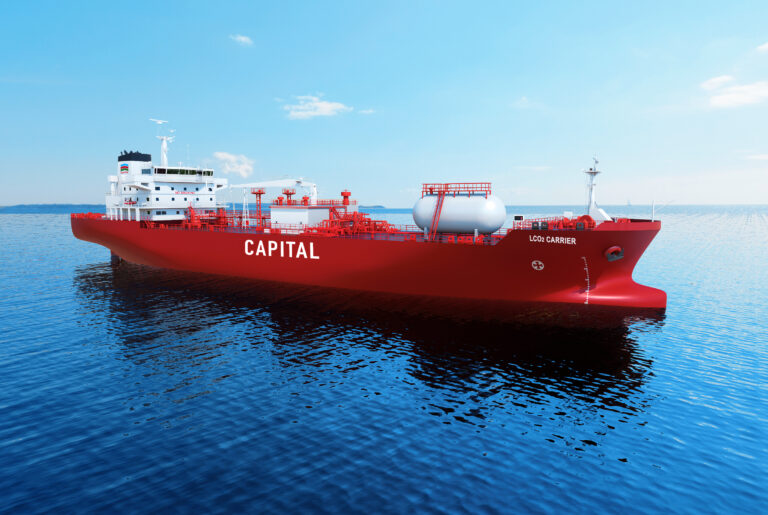Capital Gas Ship Management (Capital), Hyundai Mipo Dockyard (HD HMD) and Lloyd’s Register (LR) will work together on the construction of two 22,000m3 low-pressure LCO2 carriers, with the capability to carry liquid petroleum gas (LPG) and ammonia (NH3) with ammonia dual fuel readiness. These vessels are to be delivered in 2025 and 2026.
The new carriers will be developed for Capital’s gas carrier fleet and when built will transport liquefied carbon dioxide (CO2) under pressure. The 22,000m3 design will enable CO2 from the carbon capture and storage (CCS) process to be transported to storage facilities in larger quantities for sequestration or further usage.
The vessels will be equipped with IMO Type C storage tanks which feature lighter scantling that maintains the tanks’ structural integrity. This solution supports an upscale in the size of the LCO2 carrier, improving storage and transportation, something shipbuilders were not able to do with more conventional materials.
These ships’ materials will facilitate lighter low-pressure Type C tanks, while a cargo handling system will be able to accommodate trades in the CO2, NH3 and LPG supply chains.
Carbon capture use and storage (CCUS) can be retrofitted to existing power and industrial plants, enabling their continued operation and can tackle emissions in hard-to-abate sectors, particularly heavy industries like cement, steel or chemical manufacture. The development of a CO2 maritime supply chain will prove essential in the uptake of CCUS.
With Capital advising on operational and commercial matters relating to LCO2 carrier design development, the collaboration builds upon LR’s long-standing relationship with Capital, which among others includes a pilot research project into the use of biofuels on the Capital Ship Management Corp.-managed crude tanker Apollonas and Capital’s involvement in HD HMD and LR’s project for a 30,000m3 LCO2 tanker.
Andy McKeran, chief commercial officer of LR, said, “LR is pleased to enter into this joint venture with Capital and HMD to build two mid-size low-pressure ammonia-ready LCO2 Carriers. This constitutes a key milestone project for the CO2 value chain conveying the right message to hard-to-abate sectors that rely on CCUS for their transition. Tangible support from ship operators such as Capital will be crucial in turning the dial on decarbonization in the short to mid-term and we welcome this joint project as a key step forward for the maritime energy transition.”
Miltos Zisis, managing director of Capital, said, “We are proud to pioneer the future of maritime decarbonization with the order of the first-ever 22,000m3 LCO2 carriers. It is a testament to our proactive stance in the global decarbonization efforts. By leading the way in the CO2 transportation market, we are setting new standards for the industry and reinforcing our strategic vision for a sustainable energy transition fleet. This ambitious project represents a fusion of diligent planning and innovative execution from our technical team. Our collaboration with Hyundai Mipo Dockyard and LR reaffirms the importance we place on top-tier partners, who reflect our own commitment to excellence.”
To find out more about Lloyd’s Register’s latest developments in the electric and hybrid marine technology industry, click here.



